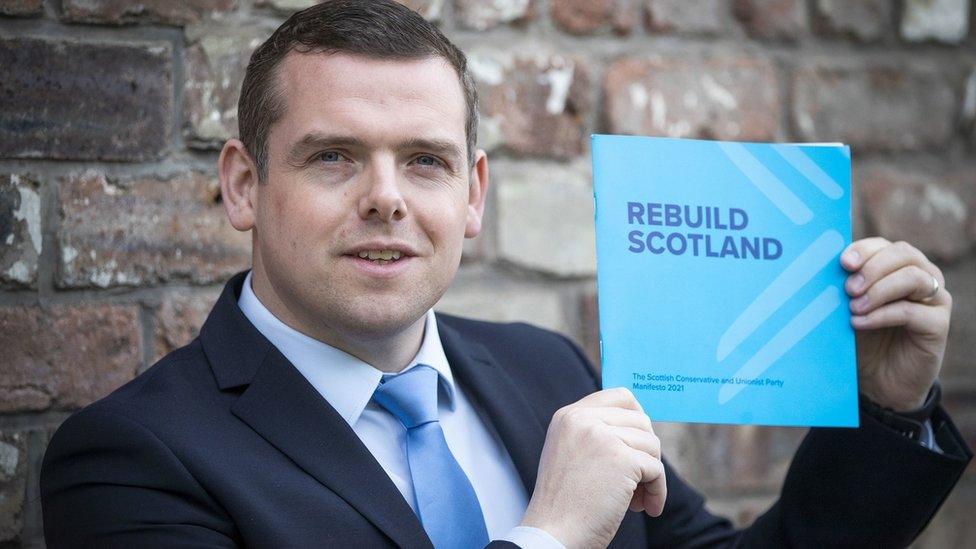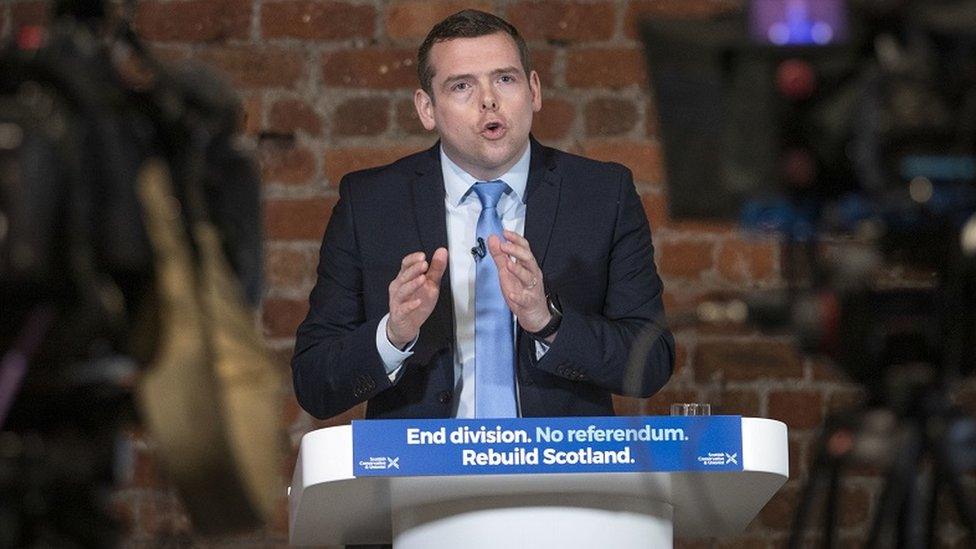Scottish election 2021: Scottish Conservative policies explained
- Published

Leader of the Scottish Conservatives Douglas Ross launched his party's manifesto on Monday
The Scottish Conservatives have launched their 2021 election manifesto, external. The full document runs to 55 pages. So, what is the party promising? BBC Scotland's correspondents have been analysing the pledges.
1. Oppose a second independence referendum

Opposition to independence is a core part of the Scottish Conservative election strategy. It features prominently in every leaflet and advert, and the manifesto is no different: the very first section is titled "end division - no referendum".
This approach has paid off in recent years, boosting the Tories ahead of Labour at Holyrood and Westminster, and they seem as eager as ever to wrap themselves in the Union flag in a bid to sweep up "No" voters.
At the same time though, the party does not want to look too obsessed with the constitution. They strive to say "rebuild" at least as often as they say "referendum".
The manifesto lays out a range of other policies, across the spectrum of Holyrood's powers, in a bid to underline that the Tories have a vision beyond just saying no to someone else's plans.
But in a way the issue of independence always lurks in the background. Because no matter what the policy proposal is, the fundamental Conservative message is that none of it will be possible if MSPs are focused on indyref2.

SCOTLAND ALERTS: Get extra updates on BBC election coverage

2. Help companies recover from Covid-19

If the ordering of chapters is any guide, the top priority for Scottish Conservatives is opposing the SNP and independence - and then comes the economy.
Targeting "full employment", they have policies to help companies recover from Covid, extending business rates holidays, hurrying along government grant applications, with funds for re-skilling and putting no limit to apprenticeship numbers.
In replacing offshore oil and gas with renewable energy, the direction is the same as other parties, though more cautious.
Affordable and social housing has an ambitious target, with a higher threshold for transactions tax among incentives for home ownership, and empty properties brought back into use.
The de-centralising theme features regional development agencies across Scotland, while councils get a guaranteed formula share of central government spending.
Tories want to be a tax-cutting party - but not yet. The priority is to spend more, including use of devolved welfare powers, spending above and beyond Whitehall levels.
Douglas Ross intends, eventually, to return higher tax rates and thresholds to alignment with Westminster. That would mean a tax giveaway this year of £460m, and leave a smaller Holyrood budget than the Scottish government would have had without devolved income tax. So it is not factored into the balanced budget set out with the manifesto, instead being a "nice to have" if the sums allow it.
Council tax goes untouched, but business rates would see a fundamental review, similar to one being carried out in Whitehall.
3. More police on the streets

A traditional Conservative "tough on crime" message runs through this manifesto.
The party wants to introduce whole life sentences, meaning an offender could stay in prison until they die.
They are calling for greater use of short-term sentences and electronic tags, and for prisoners to lose any voting rights. They want automatic early release from prison scrapped, and more police on the streets.
A Victims Law would end the "not proven" verdict, meaning juries are limited to the "clear outcome" of guilty or not guilty.
This law would enable victims to challenge any decision to not prosecute, and would keep killers in prison if they refuse to reveal a body's location.
The Conservatives also want to tackle causes of crime. They highlight education, mental health support and drug and alcohol services as areas where progress can be made.
A Protection of Free Speech Bill would replace the recent Hate Crime Bill, legislation the Conservatives warn is "over-reaching ".

SCOTLAND'S ELECTION: THE BASICS
What's happening? On 6 May, people across Scotland will vote to elect 129 Members of the Scottish Parliament (MSPs). The party that wins the most seats will form the government. Find out more here.
What powers do they have? MSPs pass laws on aspects of life in Scotland such as health, education and transport - and have some powers over tax and welfare benefits.
Who can vote? Anyone who lives in Scotland, is registered to vote and aged 16 or over on 6 May is eligible. You can register to vote online, external.

4. Education

The idea of "Covid catch up" for schools is a divisive one.
Most political parties favour an approach where teachers use current class time to offer support to individuals.
The Scottish Conservatives don't agree, saying a system-wide programme is needed.
The party would give £120m, specifically for catch up, directly to schools over the next two years and also give them guidance on the best ways to spend it to help each year group get up to speed.
It would also set up a national tutoring programme offering one-to-one or small group support to pupils who have fallen the furthest behind.
The Scottish Conservatives say it would be up to local authorities and headteachers whether this work happened within the school day or in extra hours, for example at evenings and weekends.
5. Address NHS workforce shortages

Tackling the backlog left by the pandemic and supporting staff to recover are two of the key priorities for the Scottish Conservatives.
Over the course of this year they pledge to spend £600m catching up on work that has had to be postponed. They want routine surgery and outpatient appointments to be available seven days a week with clinicians deciding who should be prioritised.
The Tories also commit to investing £40m in staff wellbeing to provide mental health support and rest facilities.
They say they will take a comprehensive approach to resolve workforce shortages. In the short term that means working with Westminster to address pension taxation issues and finding ways to encourage those close to retirement to stay on.
Acknowledging the scale of staff shortages will be welcomed. Doctors have been warning all parties not to raise unrealistic expectations of the health service.
Getting the NHS back on track remains a significant challenge and it will take time to increase capacity and find the workforce required.
6. Build on the UK's increased Universal Credit payment

"Compassionate Conservatism" has to be more than a catchphrase - and the party is trying to show it can deliver in managing the £3.6bn devolved welfare pot.
They want a specific "Scottish approach" to social security, underpinned by what they call the "broad shoulders" of the UK welfare state.
The manifesto highlights the UK government's increased Universal Credit payment of £20 per week and they will build on this by targeting specific groups in Scotland for help.
They say the £20 uplift is for support during the pandemic - not making clear it's to last, controversially, until September.
The manifesto also sets out a plan to eradicate rough sleeping by 2026, help for people with disabilities to get back into work and a top-up benefit for veterans.
Finally, they support the continuation of the Scottish government's £10m international development fund.
But their critics will be quick to point out the UK government is making significant cuts to the international aid budget - perhaps leaving them to question just what exactly is "compassionate conservatism"?
7. Widen major road arteries

The Conservatives say Scotland needs better transport links to rebuild after Covid. So they promise major investment in road, rail, and ports.
On the roads, they've pledged to widen the A1, M8 and other key arteries and to improve links across the border with England.
It's said all politics is local - so they promise to tackle a key local bugbear - potholes - with a £200m Road Maintenance Fund.
To boost the move to electric cars, the Tories plan to subsidise charging ports in public places, homes and workplaces.
They promise a Scottish Smart Travel Card, to let passengers use all types of transport with one contactless card.
The Tories say freeports - with their tax-free ring-fence - can boost exports and local employment, so they'll encourage bids from ports across Scotland, including one in the north east.
They want to improve ferry services with long-term contracts - and they'll take a look at "alternative ways" to connect island communities. Could this mean bridges to the isles - or even tunnels?
8. A national charging infrastructure for electric vehicles by 2025

This is not a manifesto which places a high emphasis on the environment or climate change; it's not mentioned in the introduction or the five point plan for rebuilding Scotland.
In the detail is a commitment for an ambitious new electric vehicle action plan which it says must deliver a complete national charging infrastructure by 2025.
It also says there should be subsidies to make both new and used EVs more affordable; although such a subsidy was cut back by the UK government only last month.
Unsurprisingly there's a stated urgency to create a new support system for farmers with a pledge to reverse Scottish government cuts to the agri-environment climate scheme. But it says new agricultural policy must allow farmers to farm while supporting efforts to become sustainable.
Scotland's sea will benefit too with a £25m cleaner seas fund that will remove plastics from the waters. And not just an expansion of marine protected areas but the introduction of "highly" protected areas.

POLICIES: Who should I vote for?
CANDIDATES: Who can I vote for in my area?
PODLITICAL: Updates from the campaign



Do you have a question about the Scottish Parliament election? Use the form below to send us your questions and we could be in touch.
In some cases your question will be published, displaying your name, and location as you provide it, unless you state otherwise. Your contact details will never be published. Please ensure you have read the terms and conditions.
If you are reading this page on the BBC News app, you will need to visit the mobile version of the BBC website to submit your question on this topic.

- Published19 April 2021

- Published22 April 2021

- Published19 April 2021
